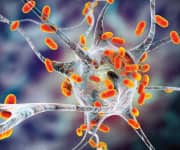Life Extension Magazine®
Our gut microbiota plays an important role in fighting off infection.1
A new study in the journal Cell reveals that taurine helps create resistance to infection in mice.
It does this by releasing sulfur compounds in the gut that are harmful to dangerous bacteria. This may help defend the body from infectious invasion.
The Gut Microbiota

The intestines are home to trillions of bacteria and other microorganisms.2 These organisms are known as the gut microbiota, and are critical to optimal digestive and whole-body health.3
Researchers recently discovered in a preclinical study that, after ingestion of a potential pathogen, the microbiota built up resistance to future exposure and infection.
Colonization Resistance

An article published in 2021 described research done at the National Institutes of Health (NIH) in Bethesda, MD.1 For their study, scientists introduced a bacterium known as Klebsiella pneumoniae (K. pneumonia) to mice.
This type of bacteria is a common pathogen in humans. It can cause pneumonia, meningitis, and other infections.4
When mice were given K. pneumonia by mouth, the bacteria colonized their gut as expected.
But when mice were first exposed to a different pathogenic bacterium, Yersinia pseudotuberculosis, several weeks before being given K. pneumonia, the pre-exposure bolstered their defenses. The K. pneumonia were not able to colonize the gut of these mice and did not cause infection.
This is known as colonization resistance. It means that previous exposure of the microbiota to harmful bacteria builds up a form of immunity against future exposures to disease-causing bacteria.5
To confirm that the microbiota played a major role in this resistance to infection, scientists transferred bacteria and the other types of microorganisms that comprise the microbiota of exposed mice to pathogen-free mice. These mice also gained resistance to K. pneumonia colonization in the intestines.
The Role Taurine Plays

The scientists next set out to investigate exactly what led to resistance to infection.
They discovered that it had to do with the amino acid taurine.
Here’s what they found:
A minor group of beneficial bacteria, called the Deltaproteobacteria, increased following exposure to the first pathogenic bacteria, Yersinia.
These Deltaproteobacteria and various other members of a healthy microbiome thrive by feeding on the sulfur-containing amino acid taurine. As they metabolize taurine, sulfur compounds are released that are harmful to dangerous bacteria like K. pneumonia.
After further research, the scientists made an extraordinary discovery: Simply adding taurine to the mice’s drinking water had the same effect.
In other words, there was no need to expose the mice to a first, harmful pathogen. Taurine alone made the mouse microbiome resistant to colonization by K. pneumonia.
Other Benefits of Taurine
While small amounts of taurine are made in the body, levels decrease with age.6,7 The best way to maintain healthy levels of taurine is through diet or oral intake.
Taurine has been found to have numerous other health benefits.
For example, studies show that taurine is needed for the optimal functioning of mitochondria, the cellular “powerhouses” that supply the energy needed for cells to run smoothly.8-10
Taurine has also been found to have anti-aging benefits, particularly for maintaining brain health.6,11-13
Thanks to the work of researchers at the NIH, we now know taurine may be vital in maintaining a healthy gut microbiome.
Summary

A recent mouse study found that after introduction to disease-causing bacteria, the gut microbiota is better able to resist colonization by other harmful bacteria in the future.
The first pathogenic bacteria spur the growth of healthy bacteria that consume the amino acid taurine. Byproducts of this taurine metabolism inhibit the growth of other potentially dangerous bacteria.
The researchers went on to demonstrate that taurine alone was sufficient to protect the mice against colonization by harmful bacteria.
Taurine is one of the most abundant amino acids in the body. It is important for protecting and maintaining cells.
We look forward to further research on the benefits of taurine in improving gut and overall health.
If you have any questions on the scientific content of this article, please call a Life Extension® Wellness Specialist at 1-866-864-3027.
References
- Stacy A, Andrade-Oliveira V, McCulloch JA, et al. Infection trains the host for microbiota-enhanced resistance to pathogens. Cell. 2021 Feb 4;184(3):615-27 e17.
- Sender R, Fuchs S, Milo R. Revised Estimates for the Number of Human and Bacteria Cells in the Body. PLoS Biol. 2016 Aug;14(8):e1002533.
- Das B, Nair GB. Homeostasis and dysbiosis of the gut microbiome in health and disease. J Biosci. 2019 Oct;44(5).
- Available at: https://www.cdc.gov/hai/organisms/klebsiella/klebsiella.html. Accessed July 23, 2021.
- Sorbara MT, Pamer EG. Interbacterial mechanisms of colonization resistance and the strategies pathogens use to overcome them. Mucosal Immunol. 2019 Jan;12(1):1-9.
- Wojcik OP, Koenig KL, Zeleniuch-Jacquotte A, et al. The potential protective effects of taurine on coronary heart disease. Atherosclerosis. 2010 Jan;208(1):19-25.
- Scicchitano BM, Sica G. The Beneficial Effects of Taurine to Counteract Sarcopenia. Curr Protein Pept Sci. 2018;19(7):673-80.
- Hansen SH, Andersen ML, Cornett C, et al. A role for taurine in mitochondrial function. J Biomed Sci. 2010 Aug 24;17 Suppl 1:S23.
- Jong CJ, Azuma J, Schaffer S. Mechanism underlying the antioxidant activity of taurine: prevention of mitochondrial oxidant production. Amino Acids. 2012 Jun;42(6):2223-32.
- Suzuki T, Nagao A, Suzuki T. Human mitochondrial diseases caused by lack of taurine modification in mitochondrial tRNAs. Wiley Interdiscip Rev RNA. 2011 May-Jun;2(3):376-86.
- Bae MA, Gao R, Kim SH, et al. Past Taurine Intake Has a Positive Effect on Present Cognitive Function in the Elderly. Adv Exp Med Biol. 2017;975 Pt 1:67-77.
- Barbiera A, Sorrentino S, Lepore E, et al. Taurine Attenuates Catabolic Processes Related to the Onset of Sarcopenia. Int J Mol Sci. 2020 Nov 23;21(22):8865.
- Ji H, Zhao G, Luo J, et al. Taurine postponed the replicative senescence of rat bone marrow-derived multipotent stromal cells in vitro. Mol Cell Biochem. 2012 Jul;366(1-2):259-67.

